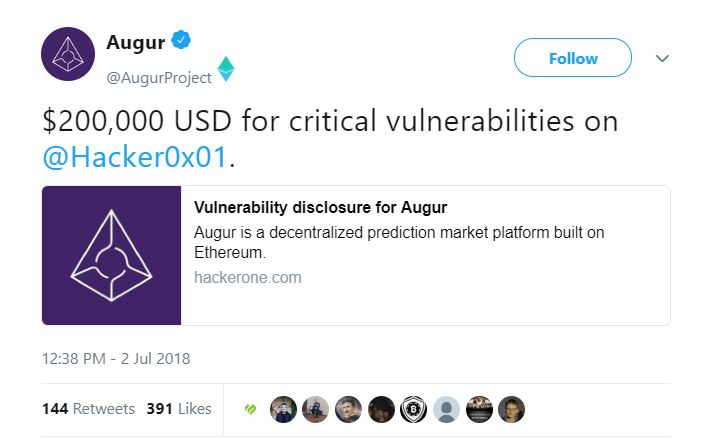In a 2016 study, Juniper Research found that the global online gambling industry is on pace to reach nearly $1 trillion in value by 2021. To many people, that might sound like a negative thing. After all, gambling doesn’t really provide any value to society besides giving millions of adrenaline junkies their fix, right? Not so fast…
One particular form of gambling, as it turns out, can have a very positive impact on how well our society functions. This “useful” form of gambling, commonly known as prediction markets, can efficiently provide insights into the probabilities of various outcomes for real-world events.
Importantly, prediction markets have proven to be more accurate than individuals or even small groups of experts at forecasting event outcomes. As a result, they can help businesses, scientific researchers, government organizations, and other human institutions to better prepare for the future. And that makes them incredibly valuable.
Prediction markets aren’t anything new. In fact, there is evidence of prediction markets existing in 16th century Italy to wager on the papal succession and the outcomes of civic elections in Italian city-states.
That being said, there is a new type of prediction market which might well prove to be more useful than any prediction markets of the past or present. I’m talking, of course, about decentralized prediction markets. Specifically, I’m talking about Augur – the long-anticipated oracle and prediction market platform built on the Ethereum blockchain.
Augur’s smart contracts are being deployed to the main Ethereum network on July 9, 2018 at 18:01 UTC.
In this article, you’ll learn why decentralized prediction markets are one of the most promising current applications for blockchain technology, why Augur’s launch is so significant, and what to do if you own or want to own Augur’s native token, REP.
Advantages of Decentralized Prediction Markets

You’re likely already familiar with centralized prediction markets in some form or another.
Sportsbooks in Vegas are one prominent example, as people from all over the world weigh in on how they expect sporting events to turn out by betting money on the outcome they think is more probable.
In the time leading up to the actual event, the odds shift to reflect how much money is being placed on each possible outcome. In the end, the people who bet right win some money, the people who bet wrong lose everything they put in, and the middlemen who manage the books take a cut.
There are a number of ways that blockchain can improve upon the centralized model. For one thing, decentralized prediction markets are permissionless. That means that anybody can participate by creating a ticket for a real-world event, betting on its outcome, and reporting that outcome in exchange for a small reward.
The ability for anybody to create tickets means that markets will likely form for far more events than are being forecasted in the present.
As explained in their 2017 roadmap update, Augur can support 3 types of prediction markets:
- Binary (YES/NO) markets — For example: Will Brazil win the 2018 World Cup?
- Scalar (range of values) markets — For example: How many Teslas will be manufactured in Q3?
- Categorical markets — For example: Which cryptocurrency will have the largest market cap on January 1, 2030? Bitcoin, Ethereum, Tron (lol jk), etc.
The possibilities for markets are practically endless. And that means that the possibilities for intelligent forecasting are endless as well.
But that’s just part of what makes Augur exciting.
When it comes to actual betting, building the markets on the blockchain eliminates the single point of failure that centralized prediction markets have, and makes it practically impossible for a government to shut Augur down. That means that anybody with internet access has the ability to place bets on the Augur platform, regardless of their location.
And finally, there’s the matter of decentralized reporting on event outcomes. This is where Augur’s appropriately-named cryptocurrency, Reputation ($REP), is most critical.
You see, there needs to be a way to ensure that event outcomes are reported accurately without needing to trust anybody to be honest for honesty’s sake. And so, reporters on the Augur platform are incentivized to report honestly on outcomes because they must put their Reputation on the line.
When REP holders report on events, some amount of their REP holdings are stored in that event’s smart contract. When the reporting period is over, a consensus on the outcome is generated and the contract automatically redistributes all of the REP in the market to the participants.
Incorrect wagers earn nothing while correct wagers earn the originally invested amount plus the stipulated reward for betting correctly. Meanwhile, honest reporters are rewarded with the return of their locked up REP plus a small payment in exchange for their service, while dishonest reporters lose REP.
By making the entire process both automatic and trustless, decentralized prediction markets are more versatile, useful, and efficient. This can have some significant benefits in society, and it’s what makes Augur one of the most promising cryptocurrency projects out there.
Augur’s Smart Contract Deployment
Augur’s co-founders, Joey Krug and Jack Peterson, first began working on the project in 2014. So you might be wondering why it’s taken so long for the platform to officially launch.
The answer is that Augur’s smart contracts present one of the most complicated engineering challenges in the entire blockchain space, and they really want to get this right on the first try.
In order to make the platform secure, it had to be meticulously programmed and thoroughly tested for vulnerabilities. For an idea of just how seriously the project team wants this launch to be successful, you need only look at the bug bounty they placed on any critical vulnerabilities in the code.
Not only does the team need to ensure that the smart contracts can’t be hacked and the REP stored within stolen, but they also need to make sure that the incentive structure sufficiently encourages honest reporting and that there is recourse available in the event that an outcome is ultimately reported falsely.
All of that is simply to say that Augur has been a long time in the making, and the fact that the official launch has arrived is exciting for cryptocurrency enthusiasts around the world, regardless of whether or not they own any REP.
What To Do If You Own REP
If you are reading this before the official smart contract deployment and you are holding REP, it is critical that you understand the token migration process.
When the migration begins, the current REP contract will be frozen, and the balances and approvals will be transferred to the new REP contract. This process should only take a couple of hours.
Anybody who has their REP on a centralized exchange or non-custodial decentralized exchange doesn’t need to take any action before the token migration.
However, if you are keeping your REP on a custodial decentralized exchange (EtherDelta, IDEX, OasisDEX, etc.), then you must withdraw the tokens prior to the migration on July 9 in order to have your balance transferred to the new REP contract correctly.
If you’re interested in purchasing some REP for the first time, you can refer to the “How to Purchase and Store REP” section of our guide: What is Augur?
Last Thoughts
Admittedly, many people have lost patience for Augur over the last couple of years. Considering that the idea for the platform was conceived before Ethereum had even launched, it certainly has felt like a long wait.
Ultimately, though, it is much better for the Augur team to have been thorough in making the platform the best it can be rather than to rush something out that’s incomplete or insecure.
The official launch is a monumental event for not just the Augur team and community, but for decentralization enthusiasts around the world. This is the type of real-world application that makes blockchain so exciting, and we should all take a moment to appreciate it.
Augur Official Site: https://www.augur.net/
Related: Augur Price Analysis: REP Meets Resistance as Mainnet Launch Looms


